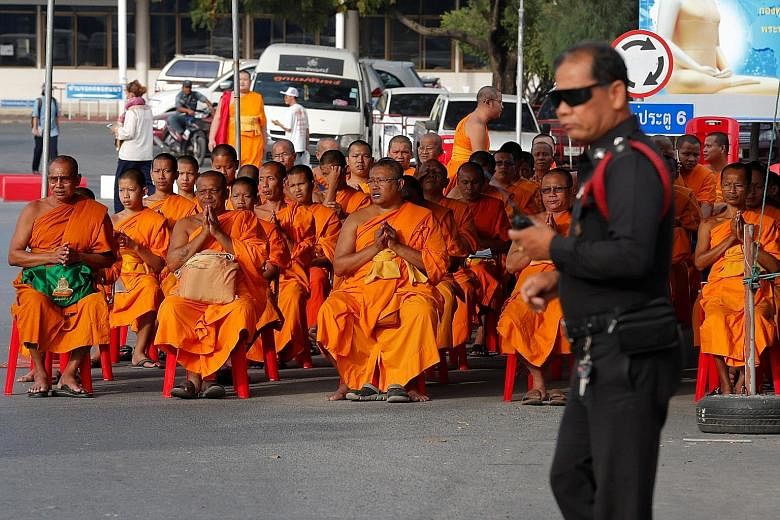Fresh tensions loom in the Thai Buddhist world after legislators amended a law to bypass a monastic council in the appointment of the country's supreme patriarch.
The change, passed yesterday by a vote of 182 to nil in Thailand's appointed assembly, means that newly crowned King Maha Vajiralongkorn Bodindradebayavarangkun - and not the council - decides who will be the country's most senior monk.
It could end the prolonged limbo over Thai Buddhism's highest authority, but also trigger a divisive backlash from monks.
The amendment, passed swiftly in three consecutive readings, was greeted with anger by members of the Buddhist clergy, some of whom had scuffled with soldiers in February as they protested against state interference in religion.
The governing body of senior monks, the Supreme Sangha Council, said it was not consulted.
Phra Methi Dhammajahn, a vocal monk who is also the deputy rector of Mahachulalongkorn Rajavidyalaya University, wrote in a Facebook posting: "From now, it is Minister Ormsin and the National Legislative Assembly who are responsible for any trouble that may come."
Mr Ormsin Chivapruck is a minister in the Prime Minister's Office who oversees the National Office of Buddhism.
Historically, Thai monarchs and monks have drawn authority from each other, though monks largely govern themselves through a hierarchical order that has been criticised for being toothless against transgressions.
Some of the more sensational cases involve monks living luxurious lifestyles, having sexual relations with women and even dealing in drugs.
Under the previous law, the Supreme Sangha Council also nominates each supreme patriarch.
But the post has been empty since the death of the last supreme patriarch in 2013, amid controversy over the council's current candidate.
Somdet Phra Maha Ratchamangkhlacharn, also known as Somdet Chuang, a 91-year-old abbot of an ancient temple in western Bangkok, has been standing in as acting supreme patriarch, and was picked by the council for the formal post early this year. But Prime Minister Prayut Chan-o-cha has not submitted his name to the King.
Somdet Chuang hails from Mahanikai, one of the two main denominations in Thai Buddhism. The other is Thammayut, which was founded by a Thai king and has produced every single supreme patriarch since 1965.
Critics of Somdet Chuang cite his alleged role in a recent motor tax evasion case to highlight his unsuitability for the job. But part of the opposition to his appointment stems from his ties to another scandal-plagued monk, Phra Dhammachayo, who is the honorary abbot of the influential Dhammakaya temple.
The 72-year-old monk has repeatedly defied police summons for allegedly laundering money, as well as encroaching on public land.
Thousands of Phra Dhammachayo's lay followers have rallied at their mega temple to prevent an arrest each time the police turn up there.
Critics believe that should the senior monk be made supreme patriarch, he will use this authority to get his former student off the hook.
"The Sangha Council has become a syndicate of power play among monks," Buddhist scholar Mano Laohavanich told The Straits Times. "There is no way to demote monks that don't behave well. They have authority and almost their own kingdom."
The new law, he said, would restore some balance to the system.

